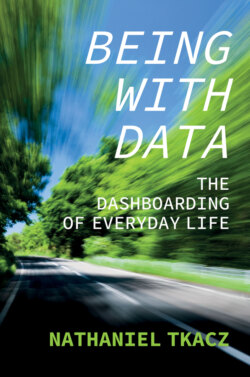Читать книгу Being with Data - Nathaniel Tkacz - Страница 6
Acknowledgements
ОглавлениеThis book began as a conversation with my former colleague Will Davies. It became something more through a project we schemed up together, ‘Interrogating the Dashboard: Data, Indicators and Decision-Making’, which received financial support from the Economic Social Research Council (ESRC) in the UK (ES/M00077X/1). I would like to thank Will, Ana Gross, Jamie Bartlett and Carl Miller from DEMOS and the Open Work design team (Kai, Lizzie and Dan) for being part of this project. Through Jamie and Carl, I was able to develop a relationship with people from the software company Qlik and I would like to thank everyone there for offering their time and thoughts. I would especially like to thank David Bolton, who arranged access to key personnel and clients.
A second set of conversations began when João Porto de Albuquerque became my colleague in the Centre for Interdisciplinary Methodologies (CIM) at the University of Warwick. I have benefited greatly from his kindness and friendship and from his opening new worlds for me. The parts of the book set in Brazil would not be possible without him. Funding from the Belmont Forum, ESRC (ES/S006982/1) and Fundação de Amparo à Pesquisa do Estado de São Paulo (FAPESP) for the project ‘Waterproofing Data: Engaging Stakeholders in Sustainable Flood Risk Governance for Urban Resilience’ enabled us to visit Brazil regularly. Flávio Horita provided early research assistance in the situation room in Cemaden. Following Flávio, Mário Henrique da Mata Martins joined ‘Waterproofing Data’ as a postdoc and became my main collaborator. While the intellectual framing of chapter 3 on ‘Formatting Data’ is my own, it draws on empirical work we did together and often with Mário taking the lead. My gratitude also goes to Maria Alexandra Cunha, based at the Getulio Vargas Foundation in São Paulo, and Vangelis Pitidis at Warwick, for offering a lot of general support with ‘Waterproofing Data’. During my visits to the situation room in Cemaden I made several new friends, including Liana Anderson, Rachel Trajber, Victor Marchezini, Conrado Rudorff and Giovanni Dolif Neto. Thanks for the lunches and dinners, the desk space and making me feel less of an outsider! Research in the situation room would not have been possible without the support of the many specialists who work in the room or support its operation.
For inviting me to share work in progress, I would like to thank Louise Amoore, Rob Kitchin, Richard Rogers, Jonathan Gray, Helen Kennedy, Robert Cowley, Scott McQuire and Theo Röhle. I am also grateful to the Digital Humanities Department at King’s College London and the Getulio Vargas Foundation in São Paulo for hosting me as Visiting Senior Research Fellow and Visiting Professor, respectively. Thanks in addition to the staff at the Coventry Transport Museum.
I am fortunate to have excellent and inspiring colleagues in CIM at the University of Warwick, but special thanks go to Nerea Calvillo and Maria Puig de la Bellacasa for being my writing companions. Celia Lury read the first draft and provided very insightful feedback. Since we first met as PhD students in Melbourne, Michael Dieter has been a constant friend and intellectual inspiration.
I would like to thank the anonymous reviewers at Polity for their feedback. The editorial team of Mary Savigar and Stephanie Homer were a pleasure to work with, and thanks to Mary for reading the manuscript with an editor’s eye.
Since 2012, I have made a home in the English West Midlands, 10,000 miles from where I was raised on the outskirts of Melbourne, Australia. This life would not be possible without the love and ongoing support of my partner, Mia. Thanks also to Ernie, Lena and Dominic for reminding me that working in front of a computer all day can be very boring.
